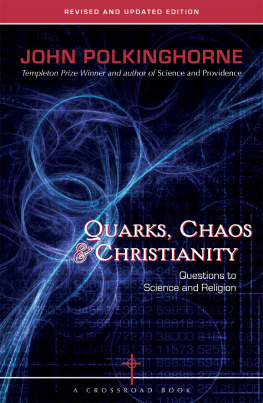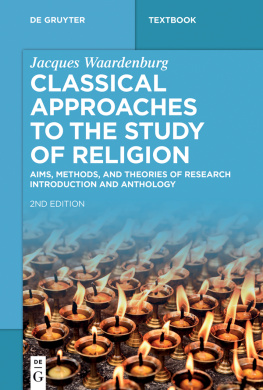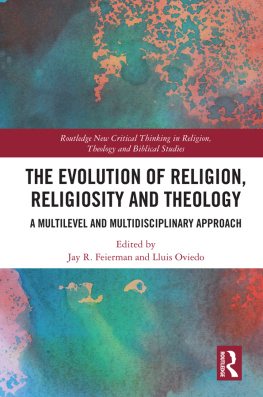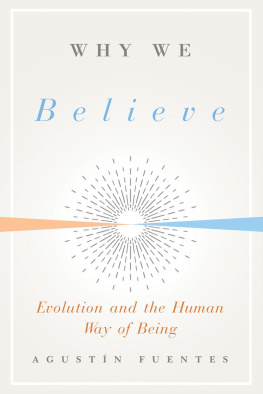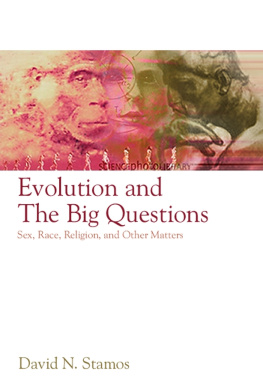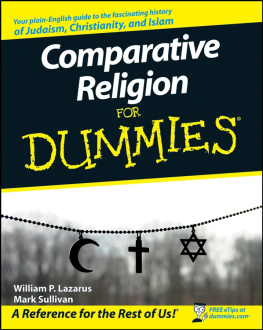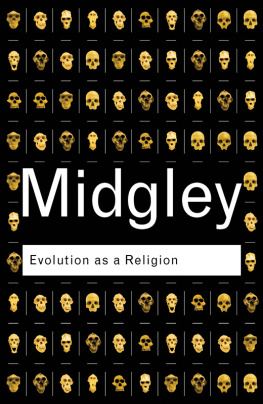L. R. Farnell - The Evolution of Religion
Here you can read online L. R. Farnell - The Evolution of Religion full text of the book (entire story) in english for free. Download pdf and epub, get meaning, cover and reviews about this ebook. year: 2011, publisher: Barnes & Noble, genre: Religion. Description of the work, (preface) as well as reviews are available. Best literature library LitArk.com created for fans of good reading and offers a wide selection of genres:
Romance novel
Science fiction
Adventure
Detective
Science
History
Home and family
Prose
Art
Politics
Computer
Non-fiction
Religion
Business
Children
Humor
Choose a favorite category and find really read worthwhile books. Enjoy immersion in the world of imagination, feel the emotions of the characters or learn something new for yourself, make an fascinating discovery.
- Book:The Evolution of Religion
- Author:
- Publisher:Barnes & Noble
- Genre:
- Year:2011
- Rating:3 / 5
- Favourites:Add to favourites
- Your mark:
- 60
- 1
- 2
- 3
- 4
- 5
The Evolution of Religion: summary, description and annotation
We offer to read an annotation, description, summary or preface (depends on what the author of the book "The Evolution of Religion" wrote himself). If you haven't found the necessary information about the book — write in the comments, we will try to find it.
This 1905 treatise, subtitled An Anthropological Study, begins with a discussion of the discipline of comparative religion, then focuses specifically on rituals of purification, and, finally, on the evolution of prayer. The authors aim throughout, as he puts it in his preface, is to cool and temper the heated atmosphere of dogmatic controversy by presenting religious facts in their true proportion and proper setting.
The Evolution of Religion — read online for free the complete book (whole text) full work
Below is the text of the book, divided by pages. System saving the place of the last page read, allows you to conveniently read the book "The Evolution of Religion" online for free, without having to search again every time where you left off. Put a bookmark, and you can go to the page where you finished reading at any time.
Font size:
Interval:
Bookmark:
L. R. FARNELL

This 2011 edition published by Barnes & Noble, Inc.
All rights reserved. No part of this publication may be reproduced, stored in a retrieval system, or transmitted, in any form or by any means, electronic, mechanical, photocopying, recording, or otherwise, without prior written permission from the publisher.
Barnes & Noble, Inc.
122 Fifth Avenue
New York, NY 10011
ISBN: 978-1-4114-6132-1
PREFACE
A SMALL book on a great and difficult subject must explain and apologise for itself, especially if it cannot claim a raison d'tre as a handbook for beginners. Having accepted the stimulating invitation to give in the spring of this year a short series of lectures for the Hibbert Trust on some subject belonging to the department of comparative religion, I felt that it was desirable to avoid those topics that had been appropriated by former lecturers; and also that the Trustees, as well as the audience, deserved that what the lecturer put forth should embody the results of some personal and original study. I finally selected for special discussion the ritual of purification, and the influence of the ideas associated with it upon law, morality, and religion; and secondly, the development of prayer from lower to higher forms. These subjects do not appear to have been as yet exhaustively treated by modern anthropology or scientific and comparative theology, and I had already worked upon them to some extent as "parerga" of the treatise that I am completing for the Clarendon Press on the history of Greek cults. I am aware that these special questions would well repay longer and more minute research, and could each furnish material for a large volume. But having been advised to publish the lectures more or less as they were delivered, I put them forth as tentative and incomplete work. I specially regret to have been unable to have gone further at present into the Egyptian evidence, with the kindly proffered assistance of Mr Griffiths, the Reader in Egyptology at Oxford.
The first two lectures, dealing with the methods and the value of the study of comparative religion and its relations to anthropology, are of a more general character. If they seem to occupy somewhat too large a part of a work of this small compass, the urgency of the questions they raise may serve as an apology. It was suggested to me that some such pronouncement might be timely at the point we have reached. For the subject is winning greater consideration, and even receiving endowment, in the organisation of the newer Universities. From the scientific point of view it is one of the most fascinating of studies; and its practical importance for our colonial administrators and our missionaries is obvious to those who reflect. It is also a legitimate hope that its wider and more intelligent recognition in England may tend to cool and temper the heated atmosphere of dogmatic controversy, by presenting religious facts in their true proportion and proper setting.
I must take this opportunity of expressing my gratitude to many friends for valuable assistance, and especially to my friend and colleague, Mr R. Marett, to whose comprehensive knowledge of the religious thought and ritual of savage races I owe many important clues.
L. R. FARNELL .
August 1905.
LECTURES I AND II
THE COMPARATIVE STUDY OF RELIGIONS: ITS METHOD AND PROBLEMS
T HE reasonable and sympathetic study of the various religions of mankind, which are perhaps the clearest mirror we possess of human feeling, aspiration, and thought in its highest and lowest forms, is only possible for the individual or for the age that feels no constraining call to suppress and obliterate all save one cherished creed. Such study began, as we should expect, in the earlier Hellenic period, the Hellenic religion throwing few or no obstacles in the way of undogmatic investigation; and the first anthropologist of religion is Herodotus. Then among Hellenistic scholars and those of pre-Christian Rome there were some who devoted themselves to the collection and exposition of the religious institutions of foreign races. But save a few short treatises, such as Plutarch's De Iside et Osiride, Sallustius' De Diis et Mundo, Lucian's De Dea Syria, nothing has survived beyond the titles and the fragments of their works; and by an irony of fortune we owe much of our knowledge of Hellenic and other religions of the Mediterranean area to the Christian controversialists, who reveal many of the essential features of the various pagan creeds in order to expose them to obloquy: they could not anticipate that we should gather as the fruit of their labours a better appreciation than we could otherwise have gained of the religions which they strove to destroy, and possibly of Christianity itself. If I were attempting, as I do not propose to attempt, to give a complete survey of the growth and development of the study which we are considering, I should probably be able to cull but little material for the narrative from Byzantine and medival sources. We may note that the spirit of these ages was, on the whole, alien to our present interest; and that it is not till after the Renaissance and the discovery of America that systematic work in this field begins again. To two Spaniards of Peruvian and Mexican descent, It is not then surprising that in England at least such claims and such ambitions should excite mistrust, even hostility, and the prestige of anthropology may have also suffered at times from the indiscretion of its friends. Still, its work is of wide vogue, its energy exuberant, and its influence in the future assured. In considering, therefore, the aims and methods of the comparative science of religion, it has appeared to me that its relations to anthropology are now one of the main points in the inquiry. And we may seem to have reached a stage where it is desirable to test our position, to take stock as it were, to examine our methods, and to consider whether they are capable of improvement. The task is difficult, and in facing it one must face the imputation of presumption, especially as in a short course of lectures one must be brief, and may therefore appear over-dogmatic.
If the comparative study of religion is to examine, as on the ground of its title it must, the various recorded or discoverable religions of every branch of the human family, then a part of anthropology, limited, as it has usually chosen to limit itself, to the study of the savage races, is obviously a sub-department of the whole. And its work, conducted often under great difficulties, has been solid, well-organised, and of high importance. Even those who deny its claim to be called a science, whatever that word may mean, must admit that it is at least an indispensable branch of historic inquiry, and that it has deepened the self-knowledge of mankind.
Some of its pioneers may have been over-eager in their theorising, premature in their attempts to reveal the origin of all religion in some savage ritual or in the background of savage thought, for instance in ancestor-worship or totemism. Such rash generalisations are inevitable in the opening periods of a new study, and may be discredited or abandoned without discrediting the investigations that gave rise to them. We may have come to be aware of the excesses of the students of totemism: we may have come to the conviction that neither theirs nor any other special and single hypothesis has as yet supplied us with the master-clue by which we can penetrate to the aboriginal source of human religion: we may have found scientific reasons for rejecting the belief that all gods arose as ghosts of departed ancestors. But if we discard such theories of origin, we owe this negative result to the maturer study of anthropology itself; and we may owe to it the positive induction that the religious product at the different stages and in the different branches of mankind was a complex growth from many different germs.
Font size:
Interval:
Bookmark:
Similar books «The Evolution of Religion»
Look at similar books to The Evolution of Religion. We have selected literature similar in name and meaning in the hope of providing readers with more options to find new, interesting, not yet read works.
Discussion, reviews of the book The Evolution of Religion and just readers' own opinions. Leave your comments, write what you think about the work, its meaning or the main characters. Specify what exactly you liked and what you didn't like, and why you think so.



